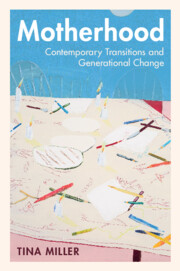Book contents
- Motherhood
- Motherhood
- Copyright page
- Dedication
- Contents
- Acknowledgements
- Introduction
- 1 Becoming a Mother
- 2 Anticipating Motherhood
- 3 Making Sense of Early Mothering Experiences
- 4 A Return to Normal
- 5 Mothering Experiences during the COVID-19 Pandemic
- 6 Conclusions and Reflections
- Appendices
- References
- Index
5 - Mothering Experiences during the COVID-19 Pandemic
Published online by Cambridge University Press: 17 November 2023
- Motherhood
- Motherhood
- Copyright page
- Dedication
- Contents
- Acknowledgements
- Introduction
- 1 Becoming a Mother
- 2 Anticipating Motherhood
- 3 Making Sense of Early Mothering Experiences
- 4 A Return to Normal
- 5 Mothering Experiences during the COVID-19 Pandemic
- 6 Conclusions and Reflections
- Appendices
- References
- Index
Summary
In this chapter, the effects of the COVID-19 pandemic on new motherhood amongst the contemporary sample are examined through ‘diary’ entries (shared by email, WhatsApp messages or voice notes) shared by participants between April 2020 and May 2021. The pandemic resulted in daily living for many being concertinaed into available rooms in homes, as spaces and time were redefined. Taken-for-granted and minutiae aspects of daily living were suddenly apparent to those not normally involved in these tasks and family, caring and work dynamics shifted. The ‘diary’ entries focus on responses to the first and subsequent lockdowns and restrictions experienced between lockdowns when restrictions continued across the UK (e.g., face coverings, limits on numbers allowed to convene and where, access restricted to some places, childcare and schools being periodically closed). The unique situation and real-time, unfolding responses illuminate several things, including how aspects of perceived good mothering are hard to escape and continue to be invoked to frame individual experiences, including examples of what they perceive to be ‘poor’ mothering (‘too much screen time’) as well as resilience and coming through the trials of lockdown. The hard work of an unremitting sense of maternal responsibility is crystalised through this exceptional year.
Keywords
- Type
- Chapter
- Information
- MotherhoodContemporary Transitions and Generational Change, pp. 112 - 145Publisher: Cambridge University PressPrint publication year: 2023

